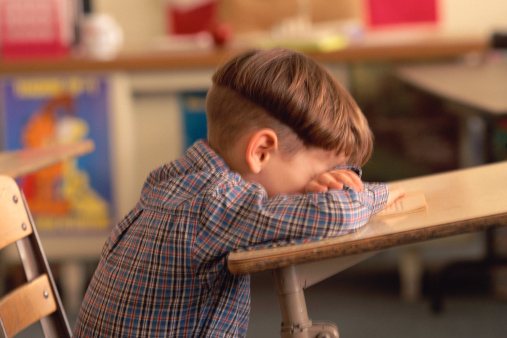by Gail Hairston
(Aug. 26, 2014) — It’s rarely easy to get a child out of bed, dressed, fed and off to school, especially when it’s still dark outside. Schoolchildren everywhere (their parents too, if they are being honest) groan for “just a little longer” in the sack.

School systems that have adjusted and re-adjusted school start times in search of the perfect balance may have to reevaluate the task after reviewing recent findings from a team of researchers at the University of Kentucky. Their work has found that elementary-age children living in middle- and upper-class neighborhoods of Kentucky demonstrate weaker academic performance when they are required to start classes early.
Recently published by the American Psychological Association, the research was led by Peggy S. Keller, UK associate professor in the Department of Psychology in the College of Arts and Sciences . She found that earlier school start times were associated with lower standardized test scores, poorer attendance, lower school rank and school under-performance.
Although Keller speculated that earlier start times would be especially risky for students attending disadvantaged schools, including Appalachian schools and those with a higher percentage of students receiving free or reduced-cost lunches, that was not the case.
“What we found, however, was early start times were associated with worse performance in schools in more affluent districts — that is, those with fewer kids getting free or reduced-cost lunches,” Keller said. “For schools with more disadvantaged students, later start times did not seem to make a difference in performance, possibly because these children already have so many other risk factors.”

The researchers examined data from 718 public elementary schools in Kentucky. Student performance was measured by looking at scores on a statewide, standardized test that assessed reading, math, science, social studies and writing. They also looked at attendance rates, the number of students who were required to repeat a grade (retention rates) and teacher-student ratios. Results were published in American Psychological Association’s Journal of Educational Psychology.
“The relationship between earlier start times and poorer academic performance may be explained by the physical, behavioral and psychological ramifications of sleep deprivation,” the researchers wrote. “Students may therefore lose the ability to remain alert and focused in the classroom.” Getting less sleep might also increase the frequency and severity of illness among students, which could also lead to lagging performance, they noted.
Another unexpected finding was higher rates of students repeating grades in schools with later start times. Every additional minute later a school started increased retention rates by 0.2 percent, the researchers found.
“To our knowledge, this is the first study to examine student retention in relation to school start times, and it is therefore difficult to draw firm conclusions about this finding,” Keller said. “However, given that other indices of school performance were improved at later school start times, one possible explanation is that once the average students begin to improve, students with learning difficulties have an especially hard time keeping up."
Most prior research on the effect of early school start times has focused on middle and high school students, on the theory that these youngsters have a harder time waking up early. The researchers in this study concluded that research on school start times shouldn’t focus exclusively on adolescents.
They also suggested that delaying middle and high school start times at the expense of making elementary school start times earlier might be a bad idea. This practice often accommodates staggered bus scheduling.
“Our findings suggest that these policy changes may simply be shifting the problem from adolescents to younger children, instead of eliminating it altogether,” said Keller.
